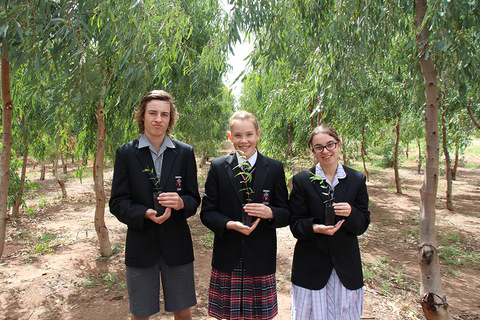
A holistic approach to environmental education
Tatachilla Lutheran College values the importance of teaching ‘sustainable’ principles and is committed to increasing students’ awareness of how natural systems work. The following are some of the environmental initiatives run by the College.
National Tree Day
Every Junior School student plants a native seedling every year. Selected Middle and Senior School students also play an active leadership role supporting younger students. During the plant days we plant around 600 native seedlings in and around the EcoClassroom Sanctuary.
Retention Pond
The 4.5 megalitre Retention Pond can be seen as visitors enter the College through the main gate. Stormwater is directed to the pond through a series of swales during winter. The water is then used to irrigate College ovals and gardens.
Tree Lot
Three tree lots, made up of a number of Eucalypt species, have been planted since the inception of Tatachilla Lutheran College. The school is not connected to a traditional sewerage system, and consequently all waste water is stored and treated on site. This treated water is then used to irrigate the two remaining woodlots. Rangers from Cleland Wildlife Park harvest the growing leaves from the Eucalypt Manna Gum tree lot as a food source for their koalas.
Vegetable Garden
Students have the opportunity to be involved in vegetable garden sessions where they participate in the annual garden cycle of planting, weeding and harvesting of a range of biodynamic produce. A number of fruit trees are found in the Eco area of the College.
There is also a weekly Garden Club where students are invited to share their lunch with other like- minded students while they assist in garden activities.
Solar Panels
In an effort to reduce its carbon output, the College produces just under 100kWh of power through solar panels located on the Gymnasium and the Science 1 Building.
Building Sustainability
Where possible, buildings have north-south orientation. Lighting in many rooms have 1/3 and 2/3 switches allowing staff to choose the amount of light needed. They are also on sensors, ensuring lights do not stay on when rooms are not in use. Air conditioners are on 2 hourly auto timers.
Recycling
Tatachilla Lutheran College has a comprehensive recycling program. This deliberate waste management strategy assists greatly with the reduction of College waste going to landfill.
We have a four bin recycling system with landfill, mixed recycling, food and organics, and 10 cent container deposit bins.
All classrooms, teaching spaces, and staff areas have paper recycling bins which are collected by students on a weekly basis.
Additional recycling programs include E-Waste, batteries, light bulbs and stationary.
In 2022 we are starting a Nude Food Action Group with students, parents, caregivers, and staff. This group will focus on further reducing our excess packing with food, particularly soft plastics.
10 cent Deposit Recycling
10 cent container deposit bins are sorted by Years 5 to 9 students as part of an Eco Service Session. Students both sort the 10 cent containers and also engage in a waste education and art activity.
Money collected from this recycling program is put to student-led eco projects.
Bettong Buckets
Leftover recess and lunch scraps from the Junior School are collected daily by ‘Bettong Bucket’ monitors. These scraps are then fed to fauna residing in the EcoClassroom Sanctuary.
Softfoot Marsupial Sanctuary Partnership
Tatachilla Lutheran College is partnered with Softfoot Marsupial Sanctuary in breeding and long term management of local endangered species, including the Brush-tailed Bettong. Students have the opportunity to help with the care and eventual release of these endangered species into the wild offering a greater awareness about the current state of our environment and its ability to hold habitat.
Marna Banggara Rewilding Project
Tatachilla Lutheran College are partners in the Marna Banggara project - an ambitious project that aims to restore southern Yorke Peninsula’s spectacular landscape by returning locally-extinct species and reinvigorating the ecological processes. The Brush-tailed Bettongs in the newer second stage of the EcoClassroom Sanctuary are part of the breeding program for release to the wild.



